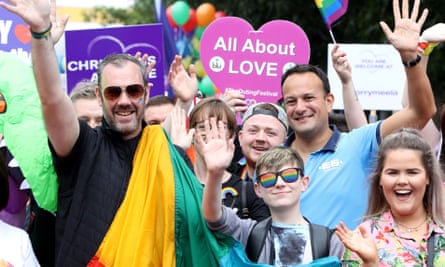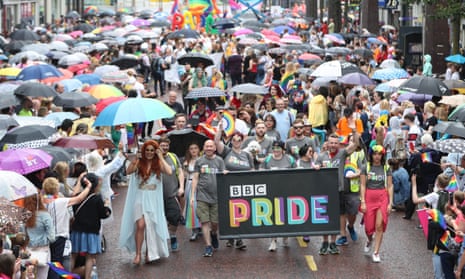BBC Northern Ireland has distanced itself from Belfast’s Pride event after some politicians in the region suggested that the broadcaster’s involvement could breach its impartiality rules by implicitly endorsing same-sex marriage.
Employees of the national broadcaster still took part in the event in Belfast on Saturday afternoon, but only after the broadcaster’s director in the region had made clear the BBC was not backing the LGBT event in a formal capacity.
Northern Ireland is the only part of Britain, Ireland, and the UK’s crown dependencies where same-sex marriage is not legal, although MPs in Westminster recently voted to extend marriage equality to the region in the absence of the devolved assembly. Same-sex marriage has been legal in the Republic of Ireland since 2015.
The BBC’s LGBT staff have previously complained about how the corporation covers such issues, with some suggesting that topics such as teaching children tolerance for LGBT people should not be up for debate on the broadcaster’s programmes. They have also contrasted the corporation’s editorial stance with internal pledges to make the BBC a welcoming place for staff of all sexualities.
Tens of thousands of people – including the Irish taoiseach, Leo Varadkar – turned out for the Belfast march, despite rainy weather. Varadkar, Ireland’s first openly gay leader, told the crowd that Northern Ireland’s biggest parade was not orange or green, but “rainbow-coloured”.

“What we see today in Belfast is Northern Ireland at its very best. Open, inclusive, diverse and for everyone,” he said.
BBC workers were initially told staff would be participating in the annual Pride parade for the first time while wearing BBC-branded T-shirts, while a statement also mentioned BBC Northern Ireland in the context of employees taking part.
This prompted complaints from some politicians in Northern Ireland. Jim Allister, the leader of the small Traditional Unionist Voice party, complained that involvement in Belfast Pride showed the BBC “is emphatically, unequivocally, unapologetically, on the side of the political debate represented by the LGBT community” and was “very clearly declaring what its values are on this issue”.
On Friday, BBC Northern Ireland director Peter Johnston acknowledged there had been “confusion” about the terms of the BBC’s involvement. He said while members of the BBC Pride staff network – an employee-led initiative – would be taking part, BBC Northern Ireland as a corporate body would not.
“We know that there are legislative issues specific to Northern Ireland in relation to same-sex marriage,” he said. “These raise important considerations for the BBC in the context of its editorial guidelines, including the requirement to maintain due impartiality within our output.
“None of this means that members of the BBC Pride network cannot be involved in Pride festivities in Belfast, but it does require BBC Northern Ireland to avoid creating the impression that it has a position on matters of political contention or controversy.
“As, and if, wider circumstances change, we will keep all of this under review. And we will continue to report and provide a forum for debate about issues relating to same-sex marriage in ways that are fair, accurate and impartial.”
Johnston added: “Our fundamental commitment is to serving and reflecting the needs of all BBC audiences and to achieving that objective with a diverse workforce in which everyone is valued.”
